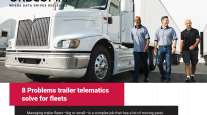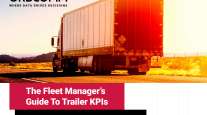Fleets Stick to Buying Habits, But Leasing Is Gaining Favor
This story appears in the July 16 print edition of Transport Topics. Click here to subscribe today.
Truck manufacturers are not seeing significant changes in the buying habits of for-hire fleets, though there are some signs of increased interest in leasing, industry experts said.
“We haven’t seen any notable change in the profile of customers purchasing trucks,” Brandon Borgna, a spokesman for Volvo Trucks North America, told Transport Topics on July 6.
John Ferry, a spokesman for Daimler Trucks North America, agreed that buyers’ habits in general are not changing.
Both officials said their companies continue to draw market strength from smaller fleets at a time when industry fleet age is the highest in at least 32 years.
“As equipment age increases and average used-truck mileage in-creases, smaller fleets seem to be back in new-truck purchase mode.” Ferry said.
Most buyers continue to come from the smaller fleet sector, trucking firms that operate fewer than 25 trucks and account for about 95% of fleets in operation, Borgna said.
Though orders have waned in recent months, in part because of the sharp rise in new-truck prices, which now are about $120,000, demand continues to be driven by fleets with available funding to refresh their equipment, both officials said.
“Carriers have to decide whether they will refresh their fleets with used models or benefit from purchasing new trucks with improved fuel efficiency and warranties,” Borgna said. “We’re seeing the availability of good, lower-mileage used trucks wane, and the shrinking supply continues to place upward pressure on price.”
Ferry said the smaller pool of late-model used trucks, actually could be helping demand.
“Fleets are not able to find low-mileage used units as in the past several years, so they seem to be going toward new units,” he said.
The tough markets today are forcing buyers to become more diligent, said John Walsh, vice president of marketing for Mack Trucks.
“Truck buyers today are being challenged by transportation management to investigate the best source of equipment acquisition more closely than ever before,” he said. “Economic uncertainty and the increased cost of new trucks largely associated with a decade of increasingly stringent emissions regulations have spurred a harder look at used truck, short-term lease and rental options.”
Unlike the other manufacturers, Mack has seen its leasing and rental activity increase, Walsh said.
A PacLease official agreed.
“The lease and rental market is going strong,” said Olen Hunter, director of sales for PacLease, the Paccar Inc. unit that specializes in private fleet leasing. Reporting a 10% increase in leasing levels so far this year, he said, “2011 was a record year, and 2012 is shaping up to be a record year as well.”
PacLease does business, he said, with 38 of the companies on the Transport Topics Top 100 list of the largest private carriers in the United States, Canada and Mexico, which don’t have difficulty raising capital.
Larger fleets are driving the increase by boosting order size, while smaller fleets tend to do one-for-one replacements, Hunter said.
He also noted that leases are attractive because they don’t require any down payment, and monthly payments are in the range of $1,500 to $1,600, which are typically are below the cost of a new tractor loan.
Leasing allows fleets to conserve capital and use their funds on their primary business rather than trucking, Hunter said. Many market dynamics are behind the increase as the average truck age hovers near record levels, driving up maintenance costs, he added.
“They realize they have come to a critical point, and they are saying, ‘I can’t run [old units] anymore,’ ” said Hunter. Maintenance costs and more costly new technology have provided an incentive for leasing instead of ownership.
“Fleets are saying maintenance is way too complex,” Hunter said, with additional costs of as much as $7,000 for tools used to ensure compliance with 2010 federal emissions standards.
Hunter also said he is seeing a trend of financing by truck makers, rather than by banks.
“Dealers and Daimler Trucks North America have done a very good job of getting Daimler Truck Financial involved in the truck purchase process,” Ferry said. “This results in a smooth transaction, so our customers are fully aware of how they are going to finance their purchase prior to deliveries.”
Borgna had a different view, however.
“Lenders understand the essential nature of trucking and view it as a good business, so we aren’t seeing the credit restrictions like we did immediately following the financial situation in 2008,” he said.
“We have not experienced a change in the creditworthiness of private fleet customers quoted this year,” Mack’s Walsh said.
Navistar Inc. did not respond to requests for comment for this story.



